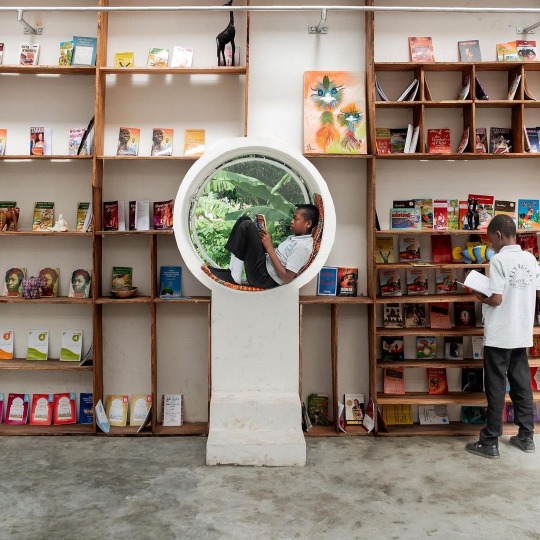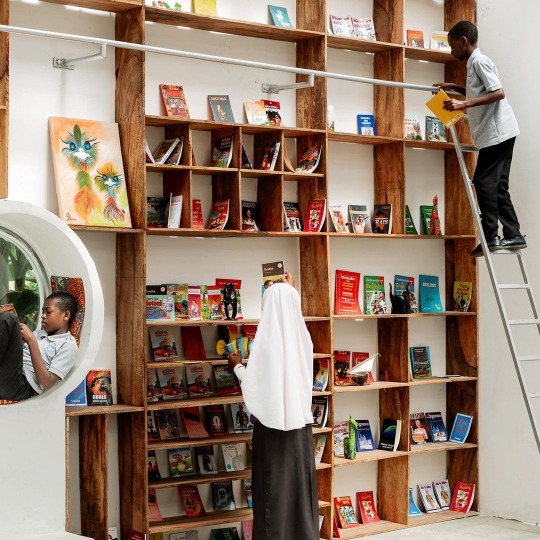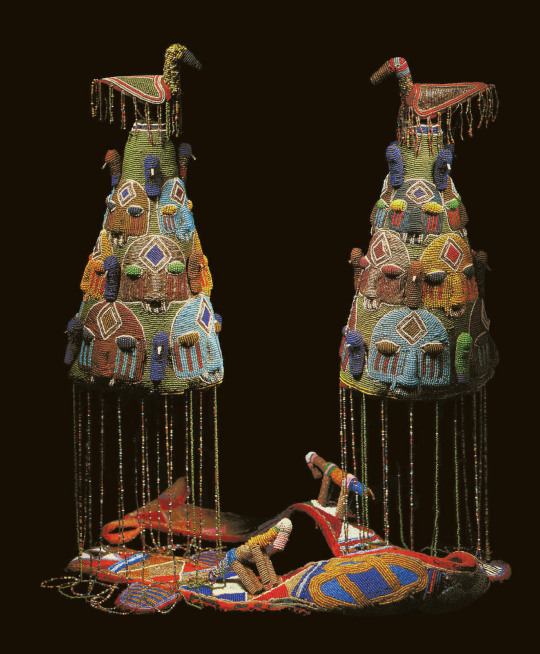#african architecture
Explore tagged Tumblr posts
Text



Mariam's Library in Tanzania, Zanzibar by Nassor Othman
#Tanzania#Zanzibar#Africa#African architecture#architecture#Mariam’s Library#Nassor Othman#Parallel Studio
4K notes
·
View notes
Text


During the 1960s numerous subsaharan African countries gained independence from their colonial rule, a process that put an end to a grim period of history during which European rulers conquered and subjugated African peoples and tribes. But the African independence movement not only shook off the shackles of foreign rule but also initiated a boom in modern architecture that has gone largely unnoticed outside of Africa: as a sign of modernization and ambition conference centers, administrative buildings, universities, high rises and luxury hotels were erected, predominantly as concrete constructions and under the aegis of European architects. The employment of the latter obviously came at the expense of local building traditions and techniques but at least local climate conditions were accounted for, a concession that resulted in expressive details and unusual forms.
Over time these buildings have nonetheless fallen into disrepair and often lost their initial purpose. Against this background and in view of their obscurity beyond Africa the architect Manuel Herz at the ETH Zurich initiated a research project focused on Ghana, Senegal, Cote d’Ivoire, Kenya and Zambia. The result is the monumental compendium „African Modernism: The Architecture of Independence“, originally published in 2015 by Park Books and presented here in its second edition from 2022. On 640 pages the volume documents a stunning selection of buildings, cities and architects that are expertly captured by photographers Iwan Baan and Alexia Webster. In an unconventional move they go beyond the purely architectural documentation and also take into account the everyday life and hence demonstrate the lively goings-on in and around the buildings.
In light of these qualities the present volume is a highly recommended opportunity to get familiar with African post-independence architecture and hopefully only the starting point for increased interest and research into the architecture of the continent.
214 notes
·
View notes
Text







Ogbojo House, Accra, Ghana - DeRoché Strohmayer
#DeRoché Strohmayer#architecture#design#building#modern architecture#interiors#minimal#house#concrete#house design#contemporary architecture#modern home#courtyard#garden#columns#brutalist#texture#earthy#plaster#accra ghana#ghana#africa#african architecture#cool homes#urban#light and shadow#cool design#elegant#design blog#architectural photography
112 notes
·
View notes
Text


Villa Aram
Located in Ngaparou
Designed by Cyrus Ardalan✨
#aesthetic#architecture#design#interior design#african architecture#senegal#ngaparou#black girl aesthetic#interior decorating#interiors#home interior#interiorinspo
28 notes
·
View notes
Text

The Goundam-Tokossel Mosque, located in the town of Goundam, Mali, stands as a testament to the rich history and diverse cultural heritage of the region. This historic mosque holds a special place in the hearts of the locals and serves as a focal point for the community.
16 notes
·
View notes
Text

5 notes
·
View notes
Text




The Woman King palace inspired by Dahomey Kingdom architecture and design.
3 notes
·
View notes
Text
Sapiens: A Brief History of Humankind
How studying the past can guide the future of design for black urbanisation

Design is about solving problems through the process of analysis, and ultimately coming up with a concept or solution for said problem and presenting the idea. There has been a question that has been plaguing my mind for a few years now and that question stems from my studies of architecture and urban planning, it is 'What does a utopian black society look like?' I was trying to conceptualise the perfect world in which Black people and people of African decent would thrive in. This question came about because ultimately I studied architecture in order to learn how great cities are built, and what I've always been taught has always come from the viewpoint of western civilization. All the 'great' Architects and thought leaders in Architecture, Urban Planning are white or Asian and more often than not men. In all my studies there wasn't anything that I learned that was taken from black or African culture and to be fair, African cities have a lot of deeply fundamental problems that they are facing with many dealing with overpopulation, informal settlements, lack of planning, poor drainage system, inadequate roads and transport infrastructure... I could honestly go on. Strides are being made to develop African cities but things are still a long way for a majority of major African cities to be called anything even close to a utopia. I sat down and wondered why that was the case and even tried to conceptualise my own vision of what the ultimate utopian African civilization could look like and function like, but I couldn't even allow my mind to go that far with my thoughts because even if said utopian society was created, 'the perfect African city' there are so many foundational fundamental ills within black society that must first be addressed before a perfect city can be created. Because lets say the perfect African city is created, how long before corruption starts to seep in by it's leadership? how long before the roads start being ill maintained? before informal selling of goods on the side of roads starts happening? before gang violence, crime and drugs start to destroy the community. It sounds very cynical and almost even racist to start saying some of these things, but I believe it's the very fact that these issues are not being addressed openly and honestly in the black community that they stay being problems.
Now, what does this have to do with the book Sapiens? There is no easy way to say this but black society is highly dysfunctional and there are many reasons we can delve into as to why and how that is the case, but ultimately surely a black utopian society would be one that would combat those ills and challenges faced by black citizens of the world. And when I say black, I refer to all black and African people of the world, on the continent of Africa, in the Carribean, America's and all over the diaspora. Regardless of where black people congregate, the same patterns emerge within their societies: poor living conditions, corruption, violence, substance abuse, crime, poor leadership and governance, greed. A lot of African's are trying hard to escape the realities of these ills in their community and more often than not through any means necessary. Huge strides have been made in things like access to education and infrastructure development etc but the fight is still very far from over and I believe it is through tackling those deep fundamental ills that are plaguing black society through which we can even begin to start creating black utopian cities. But HOW? did black society come to be the way it is? And that is how I ultimately came to read Sapiens because before I could even begin to tackle and breakdown and understand how colonialism impacted black society, I felt like I had to understand the story of how western civilization and it's systems even came to be in the first place, and Yuval Noah Harari's historical breakdown of human civilization actually takes it all the way back to the first peoples, homo erectus, neaderthals...etc all the way down to modern systems like capitalism and their impact on today's world.
Now, I would hardly call Sapiens brief, but if you consider it with the context of the story of how human society as we know it came to be, I would say that Yuval Noel Harari did a wonderful job at really breaking down the key events throughout the history of the civilisation of man that has shaped where we are today.
I know this blog is mostly about architecture, design, urbanism, art and creativity in general, and more especially within the confines of the black/African experience, so Sapiens seems a bit out of context to be talking about on this blog - but someone said something on X (formerly know as Twitter, Twitter to the ones who know) that has not left my mind, and I find that I get the most out of writing when I’m analysing something that I’m already thinking about, but the thing that the person said was that they didn’t understand racism and that when the Tower of Babel happened it brought in racism. And when I read that I knew that this work that I'm doing is very important because it's tackling very deep and fundamental problems that hold black society back from ultimately prospering, and that is my goal in this life, to see the upliftment of black people and elevate suffering and poverty from black communities and no longer let that be our story or our defining factor. So back to the person who said that they didn't understand racism and linked it to a biblical story. That right there is already one of the foundational problems that black people suffer from, not understanding history and how actually intentional and systemic racism is, and how it has been woven into mainstream culture over hundreds of years. And that's why I believe Sapiens is such a fundamental book for Africans and black people to read, in order to understand where they stand within the context of modern-day civilization. But one cannot understand where they are now, without understanding the past. And the problem with the past is actually such deeply fundamental crux within black society, and more especially if you are a Bible believing Black or any type of black person that subscribes to any of the Abrahamic religions, which is indeed, most black people, including myself. There is the ongoing debate of God vs Evolution and if you are a good chrsitian, you do not believe in evolution. You believe in the biblical account of creation of how man came to be. And that was the case for me. I never engaged at all with anything to do with evolution, I understood that it was the scientific belief of how man came to be, and learned about it in school but beyond that I never subscribed to it as my belief system because I felt that if I believed in evolution, that meant then that I don't believe the Bible. And judging by what my friend tweeted about the Tower of Babel and how it is linked to racism. I truly believe that this is the thinking and the mindset for a lot of African people.
Colonialism did a lot of damage to black society, but none as impactful as what Christianity and Religiousness has done to the black society, and this I say as a God fearing Bible believing woman. Because African and Black society is so rooted in Faith in God, they fail to critically analyze the world at large around them, because their full and entire reliance is on God. And there is nothing wrong with praying, but they spend more time praying for things to change as opposed to working towards changing things that are within their power to change. They pray for a better quality of life but do not invest in schools, education, infrastructure, healthcare etc. Too much reliance is placed on having faith, but having the faith to ACT on the things they believe their world should be lacks. They believe there shouldn't be sickness, and yet, they don't work to improve healthcare infrastructure, they believe they should have wealth and prosperity but don't work on creating and developing industry in their own communities, they believe that crime, gang violence and substance abuse shouldn't have a place in their society but make no efforts to improve law enforcement or criminal rehabilitation in their communities. Ultimately you can get down on your hands and knees and pray everyday for things to change, but at the same time, if you do not use those same hands and feet that God gave you, that you use to pray with, to stand up and build, there will not be a safe space and utopia for black citizens to thrive in. I love the book Sapiens so deeply because for the first time in my life, it truly made me engage with evolution and the idea of a 'master race' etc. It made me genuinely critically analyze very certain deep and fundamental beliefs I had about myself and my faith and black society etc. It made me engage with history, and even my own beliefs about my own history from a very different viewpoint, and it's honestly been one of the most life-changing and paradigm shifting books I've ever read. And even especially as a designer, because ultimately the role of the architect and designer is to serve the needs of people, but in order to serve people and design for people you must understand people. And understanding the history of human kind from this perspective has helped me to gain new insight into certain motivations behind certain systems that are in place that exist, like racism. And so by understanding how certain ills came to be, it can be the first steps in pathologozing black society and ultimately finding the solutions needed to cure the ills in the black community. And so, just as I recommended to my friend, I recommend you read Sapiens as an architect, urban planner or designer. There's much more reading I'll be doing and I'll be sharing my thoughts and ideas as I encounter them. But Sapiens for me was one of the best books I've ever read and I highly recommend it, for anyone who has any pressing questions about our human civilization and how we got to where we are now.
You can listen to this very interesting conversation on the What Now Podcast with Trevor Noah, between Trevor and Yuval Noah Harari. A very great episode and my favorite podcast!
youtube
#architecture#design#art#inspiration#african#life#creativity#africa#reading#books and reading#education#black architect#black culture#african architecture#african culture#Youtube
2 notes
·
View notes
Text
A Tuareg Village Tents in the Ubari Lakes Area
A Tuareg village can be found in the stunning Ubari Lakes area of the Sahara Desert in Libya. The Tuareg people are semi-nomadic herders and traders. They primarily live in Northern Mali. Their presence extends into Niger, Burkina Faso, Algeria, and Libya. They trace their ancestry back to the Berbers of North Africa and speak a Berber language called Tamasheq, often referring to themselves as…
#A Tuareg Village Tents#African architecture#North Africa Architecture#Tuareg#Tuareg History#Ubari Lakes Area
5 notes
·
View notes
Text

#god#i#love this#pic#tunisia#north africa#architecture#african architecture#north african architecture#ksour#places#aesthetic#wanderlust#desert#desert beauty#desertcore
5 notes
·
View notes
Text







Sacred Heart Cathedral of Kericho, Kenya - John McAslan & Partners
#John McAslan#architecture#design#building#modern architecture#interiors#minimal#concrete#modern#contemporary#contemporary architecture#church#modern church#church building#church architecture#religious architecture#cool architecture#beautiful buildings#beautiful design#light and shadow#colour#timber#wood interior#concrete structures#kenya#africa#african architecture#british architecture#design blog
34 notes
·
View notes
Text
Why is history taught in a linear way?
I’ve been seeing this discussion all over my TikTok feed about how history is taught in a certain way to push a certain narrative. Rhetoric, if you will.
So I’m currently trying to learn more about architecture. The history, to help me understand what is being signified when one alludes to a building as Mid-Century modern.
In that spiral, I’ve learnt that the Cradle of Civilisation is Mesopotamia. And obviously, as I always wonder. What is civilisation? Who decides what civilisation is?
So let me define and unpack the idea of civilisation (in western thought). Civilisation according to the Oxford Dictionary is “the stage of human social and cultural development and organization that is considered most advanced”.
These advancements are determined most specifically by scholarly advancement. Through cultural, scientific, technological, economic growth or development.
But there is also a set criteria on how scholarship is classified as such. For the West, it is through epistemologies and certificates to show that one has indeed gone through the rigorous and systematic process of schooling.
So for the global south cultures, where learning does not follow the same set of principles. Or as a matter of fact, has been deprived of the ability to develop and immortalise their epistemologies in writing. The knowledge systems and architecture are not regarded as examples of great civilisation.
And to link this back to architecture. Our cyclical structures, and sustainable material such as mud and thatch are seen as primitive. Which then effectively excludes us from being seen as civilised.
Any way, that’s all I have to ramble about today.
6 notes
·
View notes
Text










Lewis Hamilton in Morocco
#tumblr dump#lewis hamilton#team lh44#greatest of all time#black people#morocco#beautiful africa#african architecture#architecture#africa#beautiful destinations#desert holiday#african holiday#Moroccan holiday#Camel#plus 44
4 notes
·
View notes
Text
African Art: Ancient Inspirations, Modern Expressions
African Art: Ancient Inspirations, Modern Expressions

View On WordPress
#africa#african#african architecture#African Art#African culture#African history#Art#Art History#Asia#Asian Art#Asian Art Books#asian cultures#book#ebook#history#kindle book#Negro Civilizations#Parkstone#Parkstone International#postaday#postaweek#Prehistoric#religious#sculpture#South Africa#Textiles#West Africa#Woodcarving
15 notes
·
View notes







